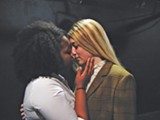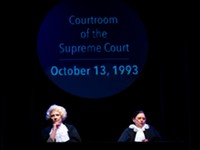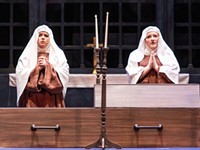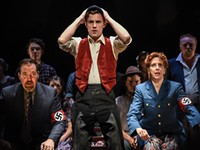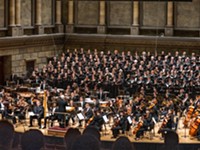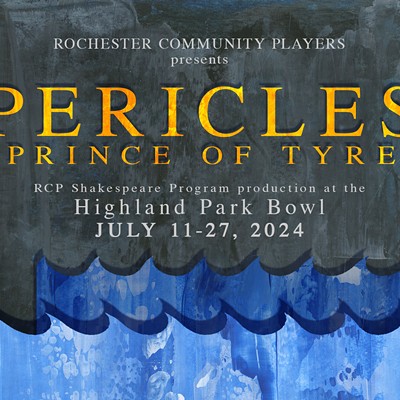[
{
"name": "500x250 Ad",
"insertPoint": "5",
"component": "15667920",
"parentWrapperClass": "",
"requiredCountToDisplay": "1"
}
]
When he graduated from Nazareth College in 2000, J.R. Teeter had already started a theater company, at least in name. For his senior thesis, he directed a play and gave the performers a name: Bread & Water Theater. Almost a decade and a half later, Bread & Water is still trying to give Rochester basic theatrical nourishment.
"A lot of us, when we graduated, were disappointed in the local theater scene," Teeter says. "We were used to doing this progressive, funky theater at school, and there wasn't much of it around Rochester. We wanted to do theater that spoke to us." So Bread & Water found its niche as a small, but feisty company that presents all manner of plays, old and new — often examining sexuality and gender roles, and always with a politically progressive agenda.
The company has had various locations over the years, but in May, it moved into a permanent home on West Main Street (formerly occupied by Downstairs Cabaret, and a boxing gym before that), The space is being busily renovated: there is a lobby gallery with its own curator, and other groups use the space for comedy improv and dance performances.
Bread & Water begins its second Rainbow Theater Festival in November with two stylistically different plays that explore various aspects of religion and sexuality: "The Jeweler's Shop" by Karol Wojtyla, and "God of Vengeance" by Sholem Asch. (A third play, "Confessions of a Nightingale," about Tennessee Williams, has been rescheduled for spring 2015.)
If Karol Wojtyla has a familiar ring, you may know him better as Pope John Paul II. The play belongs to a period in his life when he was deeply involved in the thriving post-World War II theater scene; Wojtyla wrote several plays, including a Polish translation of "Oedipus Rex." Published anonymously in 1960 and virtually unknown until Wojtyla became Pope, "The Jeweler's Shop" has been performed around the world and was made into a movie.
Each act of the play presents a different couple in an exploration of love and marriage — "the greatest dramas of human existence," in Wojtyla's words. During Bread & Water's production, the three couples are played by three actors: Mackenzie Whitman, Sean Parfitt, and Dylan Dowdle. Unsurprisingly, they are male-female couples in the original, but Teeter and director Lawrence Brewley opted to make one of them a same-sex couples. Teeter admits that Wojtyla's views on sexuality were definitely not progressive, but he does think that having a gay couple does not contradict anything in the play, and in fact enhances its view of the challenges of love and commitment.
If "The Jeweler's Shop" is spare and poetic, "God of Vengeance," a 1906 play originally written in Yiddish, is fiercely dramatic. The setting is the home of Yekel, a Jewish brothel owner (Jack Simel) whose daughter, Rivkele (Casey Litzenberger), is promised in marriage to a respected scholar. Rivkele, however, has fallen in love with Manke, her father's most valuable prostitute (Sadiyyah Osbourne). The two women escape, but are quickly forced to return to the brothel.
"God of Vengeance" was quite successful in its initial European productions. But when it was performed in New York City in 1923, audiences were shocked and the cast was arrested on obscenity charges. Teeter found that with some judicious trimming, "God of Vengeance" still packs a punch — and reveals itself as a forward-looking work.
Still, "God of Vengeance" offered much to offend early 20th-century U.S. audiences, starting with its sympathetic portrayal of the lives of prostitutes. Asch showed that many of them did not enter "the life" out of free will. (Teeter notes that Shaw's "Mrs. Warren's Profession," which similarly shocked Victorian sensibilities, comes from about the same time.)
As for the love interest between Rivkele and Manke: "It's amazing for the time," says Teeter. "The relationship is never considered tawdry, but it's mature, romantic, and three-dimensional."
If that was not enough, audiences also were disconcerted by the play's unhappy ending. For many, Teeter says, Asch suggested that the God of Vengeance persecuted Jews, though they were probably just as scandalized by Asch's suggestion that many pillars of the Jewish community were hypocrites.
"Asch held a mirror up to the Jewish community, and it didn't like what it saw," Teeter says. "One of the actors in the show said to me, 'This was a brothel in a tight-knit Jewish neighborhood. Everybody had to know what was going on, and the people who condemned it the most were probably also among its customers.'"
Teeter has little trouble finding actors to perform the challenging plays he most enjoys. "Bread & Water attracts two kinds of actors," he says. "Many don't have a lot of acting experience, but still want to be challenged. The others are firmly committed to the play they're in, and know what we are trying to accomplish.
"It takes a special kind of actor to respond to a director who tells him, 'Okay, you're a Jewish brothel owner, 1900. Go!' But if you can go with it and learn to create a character like that — somebody who is completely unlike you — you can act in anything."
Speaking of...
-

ART: The end is the beginning
Sep 18, 2013 -

THEATER: The next act
Sep 18, 2013 -

DANCE: On their toes
Sep 18, 2013 - More »
